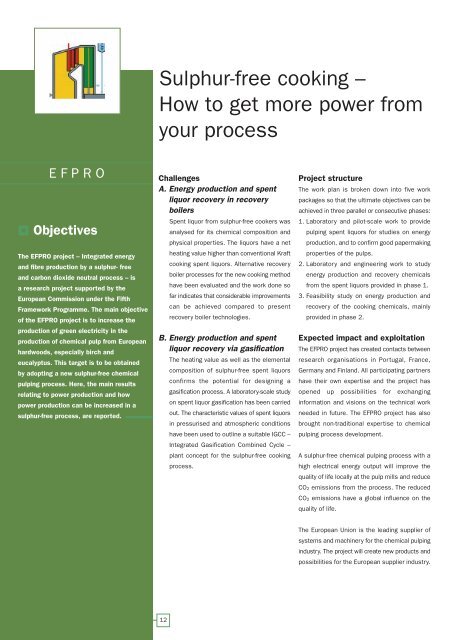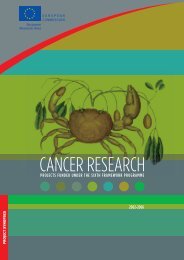European Bio-Energy Projects
European Bio-Energy Projects
European Bio-Energy Projects
Create successful ePaper yourself
Turn your PDF publications into a flip-book with our unique Google optimized e-Paper software.
EFPRO Challenges<br />
A. <strong>Energy</strong> production and spent<br />
liquor recovery in recovery<br />
boilers<br />
Objectives<br />
The EFPRO project – Integrated energy<br />
and fibre production by a sulphur- free<br />
and carbon dioxide neutral process – is<br />
a research project supported by the<br />
<strong>European</strong> Commission under the Fifth<br />
Framework Programme. The main objective<br />
of the EFPRO project is to increase the<br />
production of green electricity in the<br />
production of chemical pulp from <strong>European</strong><br />
hardwoods, especially birch and<br />
eucalyptus. This target is to be obtained<br />
by adopting a new sulphur-free chemical<br />
pulping process. Here, the main results<br />
relating to power production and how<br />
power production can be increased in a<br />
sulphur-free process, are reported.<br />
Sulphur-free cooking –<br />
How to get more power from<br />
your process<br />
12<br />
Spent liquor from sulphur-free cookers was<br />
analysed for its chemical composition and<br />
physical properties. The liquors have a net<br />
heating value higher than conventional Kraft<br />
cooking spent liquors. Alternative recovery<br />
boiler processes for the new cooking method<br />
have been evaluated and the work done so<br />
far indicates that considerable improvements<br />
can be achieved compared to present<br />
recovery boiler technologies.<br />
B. <strong>Energy</strong> production and spent<br />
liquor recovery via gasification<br />
The heating value as well as the elemental<br />
composition of sulphur-free spent liquors<br />
confirms the potential for designing a<br />
gasification process. A laboratory-scale study<br />
on spent liquor gasification has been carried<br />
out. The characteristic values of spent liquors<br />
in pressurised and atmospheric conditions<br />
have been used to outline a suitable IGCC –<br />
Integrated Gasification Combined Cycle –<br />
plant concept for the sulphur-free cooking<br />
process.<br />
Project structure<br />
The work plan is broken down into five work<br />
packages so that the ultimate objectives can be<br />
achieved in three parallel or consecutive phases:<br />
1. Laboratory and pilot-scale work to provide<br />
pulping spent liquors for studies on energy<br />
production, and to confirm good papermaking<br />
properties of the pulps.<br />
2. Laboratory and engineering work to study<br />
energy production and recovery chemicals<br />
from the spent liquors provided in phase 1.<br />
3. Feasibility study on energy production and<br />
recovery of the cooking chemicals, mainly<br />
provided in phase 2.<br />
Expected impact and exploitation<br />
The EFPRO project has created contacts between<br />
research organisations in Portugal, France,<br />
Germany and Finland. All participating partners<br />
have their own expertise and the project has<br />
opened up possibilities for exchanging<br />
information and visions on the technical work<br />
needed in future. The EFPRO project has also<br />
brought non-traditional expertise to chemical<br />
pulping process development.<br />
A sulphur-free chemical pulping process with a<br />
high electrical energy output will improve the<br />
quality of life locally at the pulp mills and reduce<br />
CO2 emissions from the process. The reduced<br />
CO2 emissions have a global influence on the<br />
quality of life.<br />
The <strong>European</strong> Union is the leading supplier of<br />
systems and machinery for the chemical pulping<br />
industry. The project will create new products and<br />
possibilities for the <strong>European</strong> supplier industry.

















